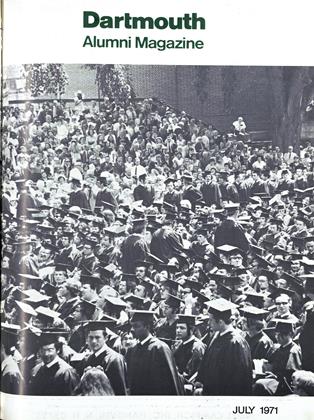Let me tell you a story:
One night, not too long ago, I woke with terrible pains in my stomach. I was sure I was going to die. I was lying in bed, next to the very desk at which I had spent long hours, poring over mathematics texts and film scripts, Russian novels and computer printouts. Somehow though, the desk seemed unreal, and my books, though still stacked as neatly as I had left them, didn't look right. Sure, they were still bound, and the pages were unruffled, but while they had previously been the center of my existence, they now just looked like ink on paper. Black lettering on white paper surrounded by glued cardboard covers. The pain persisted, and as my stomach swelled almost to the breaking point, I wondered how I could have been so foolish as to mistake my books for gods.
But the pain passed. I didn't die. Next morning, my books were still neatly stacked on my desk. And that next afternoon, I opened a math text, then a film script, then Russian novel. I even unrolled a computer printout. I sat my desk and studied, but couldn't manage to concentrate. How foolish I had been! To think that perhaps I was going to die! But all the same, though I was alive and my routine was restored, I couldn't see my books as they had been before. They still remained black letters on white paper. 6
Since that experience, I have found it hard to live. I have thought of suicide, but been unwilling to commit it. I have rejected graduate school offers because I could not worship black ink on white paper. I have made no plans, because I have found no plans worth making.
Clearly then, I am a mad person in a sane world. Taw pity on me, those of you who can justify the air you breathe Send me letters and tell me why life is worth living. Tell me what meaning there is in life. My address is 505 East 14 Street, New York, 10009.
Rich parents, write and tell me how money makes your life worthwhile. Tell me how green ink on white paper is different, more godlike perhaps, then black ink on white paper. Dartmouth alumni, tell me how the Dartmouth Experience has given value to your existence. Is the Dartmouth bond that strong? How did I not feel its attraction? And fellow graduates, fellow members of the Class of 1971, take pity on a student who did not think, but only studied. Tell me how you have justified your existence to yourself, or perhaps, why you have not felt the need to do so. And if some one of you out there is also mad like me, write me a letter and tell me how you came to appreciate the absurdity of your life.
Perhaps I am not alone.
 View Full Issue
View Full Issue
More From This Issue
-
 Feature
FeatureThe Commencement Address
July 1971 By GUNNAR MYRDAL, Sc.D. '71 -
 Feature
FeatureAlumni Council Honors Seven
July 1971 -
 Feature
FeatureThe Fifty-Year Address
July 1971 By JOHN L. SULLIVAN '21 -
 Feature
FeatureHONORARY DEGREE CITATIONS
July 1971 By honoris causa. -
 Feature
FeatureCOMMENCEMENT 1971
July 1971 By CHARLES J. KERSHNER -
 Feature
FeatureMcCulloch Heads Council
July 1971
Features
-
 Features
FeaturesBest of the Rest
SEPTEMBER | OCTOBER 2022 -
 Cover Story
Cover StoryHanover to Moosilauke or Bust
NOVEMBER 1999 By Jon Waldman ’00 -
 Feature
FeatureWhere Are the Silver Cornets? or Twenty Versts to Nizhni Novgorod
By KENNETH ALLAN ROBINSON -
 Feature
FeatureThe Fifty-Year Address
July 1958 By LAURIS G. TREADWAY '08 -
 Feature
FeatureSome Faults, Some Solid Achievements
November 1975 By M.B.R. -
 Feature
FeatureBards in a Barren Desert
November 1982 By Stephen Geller '62

